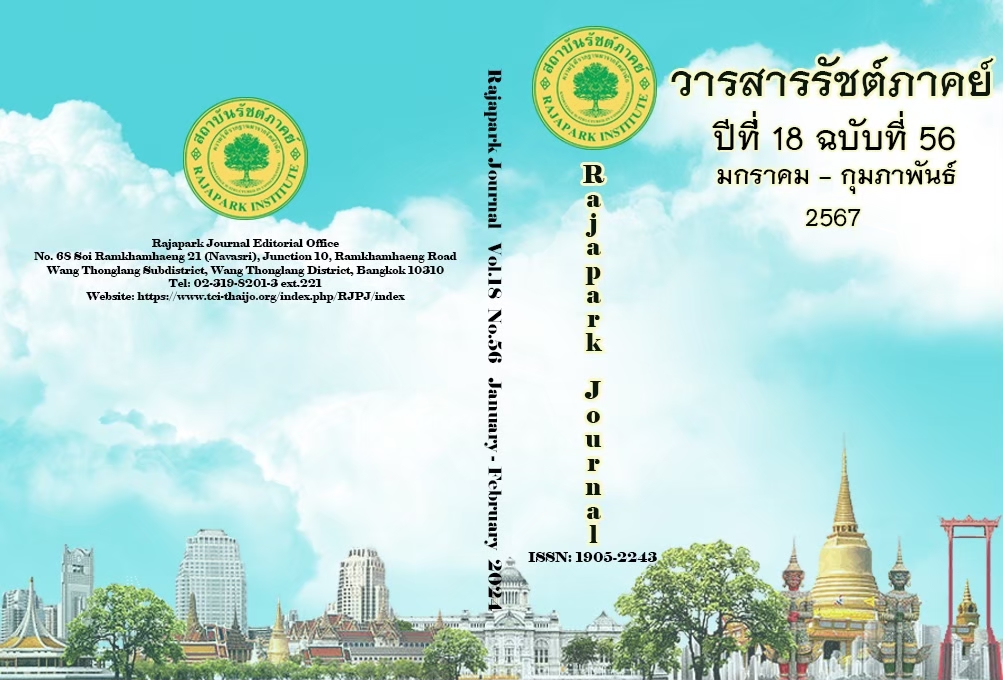The Legal Architecture of Employment Contracts for Professional Sport Players Under the Legal Tradition of Thailand, Britain, Germany, Spain and Italy
Main Article Content
Abstract
This article presents the results of research on the legal architecture or legal framework of contracts for professional athletes in the legal systems of Thailand, England, Germany, Spain, and Italy. The objectives of the study are threefold: 1. To examine the current situation and legal issues related to contracts for professional athletes in Thailand. 2. To compare the legal framework of contracts for professional athletes in Germany, England, Spain, Italy, and Thailand. And 3. To propose improvements and developments to the legal measures for contracts for professional athletes in Thailand. The research employs a qualitative research method, analyzing data from documents. The research reveals that England and Germany apply general labor laws to regulate contracts for professional athletes, while Spain, Italy, and Thailand use specific sports laws. In Thailand, contracts for professional athletes and sports personnel fall under the jurisdiction of the Promotion of Professional Sports Act of 2013 and the Regulations of the Professional Sports Committee on Standards for Hiring and Protection Measures of 2017. Furthermore, the study indicates that contractual relationships involving celebrity or superstar athletes and sports clubs tend to be more commercial than labor contracts. However, existing laws do not adequately address these commercial contracts, highlighting a lack of alignment with the evolving environment. Consequently, legal amendments are necessary to better suit the current landscape.
Article Details

This work is licensed under a Creative Commons Attribution-NonCommercial-NoDerivatives 4.0 International License.
Views and opinions appearing in the Journal it is the responsibility of the author of the article, and does not constitute the view and responsibility of the editorial team.
References
Colucci, M., & Hendricks, F. eds. (2014). Regulating Employment Relationships in Professional Football a Comparative Analysis. European Sports Law and Policy Bulletin, 1, 1-455.
Dagan, H., & Heller, M. (2013). Freedom of Contract. Columbia Law and Economics Working Paper No. 458. https://scholarship.law.columbia.edu/faculty_scholarship/1825
Disney, R. (2006). Remuneration of Sport Stars: Implementations for Regulation. ResearchGate. https://www.researchgate.net/publication/228593090_Remuneration_of_Sports_Stars_Implications_for_Regulation
Duval, A. (2016). The FIFA Regulations on the Status and Transfer of Players: Transnational Law-Making in the Shadow of Bosman. http://www.file:///C:/Users/Instructor/Downloads/SSRN-id2760263.pdf
European Sectoral Dialog Committee for Sports and Active Leisure. (2021). Guideline for Working Time in the Sports and Leisure Sector. https://euathletes.org/wpcontent/uploads/2017/06/2014-ESSDC-Guidelines-On-Working-Time.pdf
Hendrick, F. (2017). What if Sport and Labour Law have Become Interlocked?. In ISLSSL PRAGUE XII European Regional Congress, (pp. 1-9). 20-22 September 2017, Prague. https://www.ercprague2017.cz/wp-content/uploads/2017/02/Hendrickx_What-if-sport-and-labour-law-have-become-interlocked.pdf
Liew, J. (2015). How the Bosman Revolution Changed Football Forever. https://www.telegraph.co.uk/sport/football/competition
Parrish, R. (2014). “Employment Relationships at National Level: England”. In Michele Colucci and Frank Hendricks (eds), Regulating Employment Relationships in Professional Football a Comparative Analysis, European Sports Law and Policy Bulletin, 1, 129-165.
Scarfe, R., Singleton, C., & Telemo, P. (2020). Extreme Wages, Performance and Superstars in a Market for Footballers. Department of Economics, University of Reding. https://www.reading.ac.uk/web/files/economics/emdp202004.pdf
Siekmann, R. (2006). Labour Law, the Provision of Services, Transfer Rights and Social Dialogue in Professional Football in Europe. Electronic Entertainment and Sports Law Journal, 4(1), 1-3. http://www.warwick/ac.uk/fac/soc/law/elj/elj/issues/volume4/number1/seikmann
Sienicki, J. (2014). “Employment Relationships at National Level: Germany,” In Michele Colucci and Frank Hendricks (eds), Regulating Employment Relationships in Professional Football a Comparative Analysis, European Sports Law and Policy Bulletin, 1, 1-455.
Thanapornpan, R. (2001). Sport in the Cultural Capital System. http://www.rungsun.econ.tu.ac.th
The Center for The Law and Economics of Sport. (2013). The Economic and Legal Aspects of Transfers of Players. https//www.europa.eu/eu/publication-detail/publication/5fde15c2-647c
Turlan, F., Schnee, T., Abelleira, F. G., Macmillan, R., Provenzali, P., & Middlemas, J. (2021). Study On the Legal Framework on Employment Contracts in Four EU Member States (Germany, Spain, Britain and Italy) for Sport Workers not Being Professional Sportsmen and-Women. https://www.cebre.cz/dokums_raw/planetlabor_study.pdf.
VanderVelde, L. S. (1992). The Gendered Origins of the Lumley Doctrine: Binding Men's Consciences and Women's Fidelity. The Yale Law Journal, 101(4), 729-1996.
Welch, R. (2017). Employment Law in Sport. https://www.researchgate.net/publication/320555659


